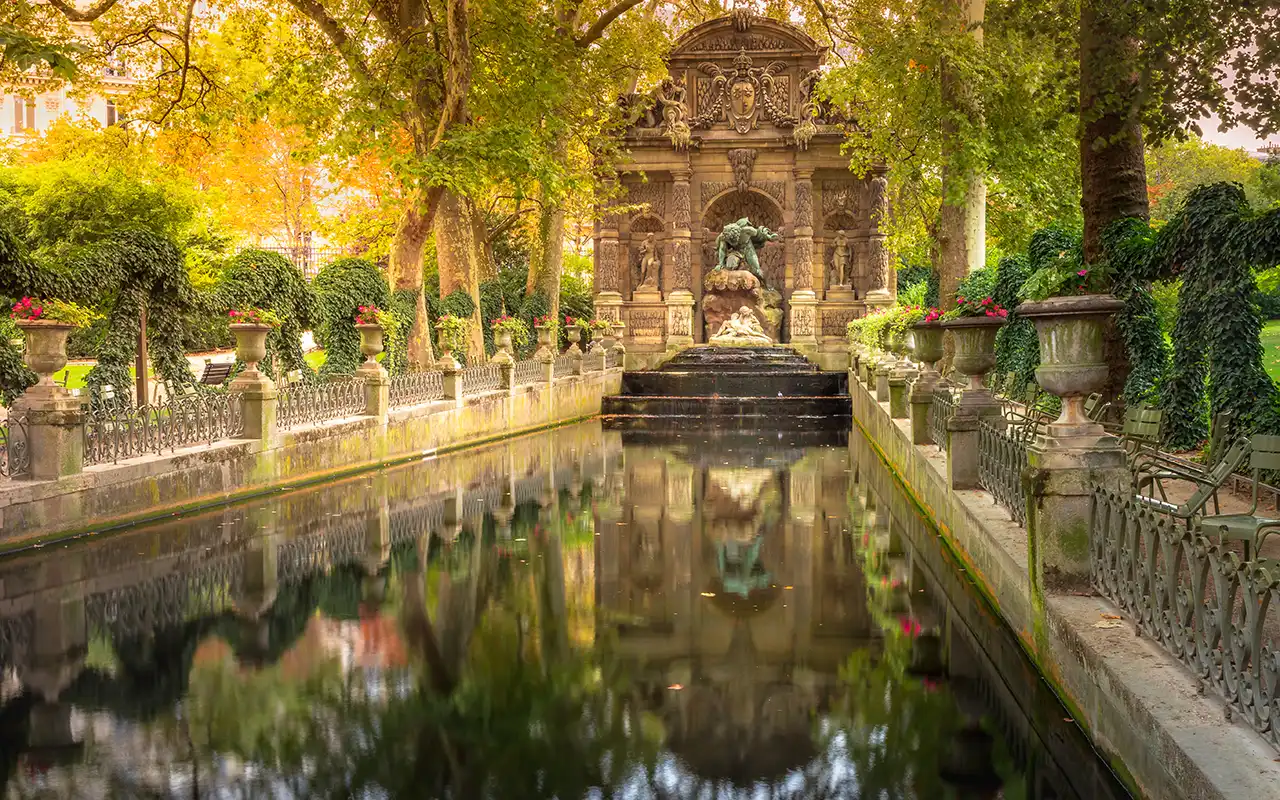Claim to Fame
Luxembourg Gardens (Jardin du Luxembourg) is one of Paris’s most cherished green spaces, blending French formal design with romantic charm — a favorite retreat for locals, artists, and visitors alike.
📌 Navigating Luxembourg Gardens : Answers to Frequently Asked Questions
- Admission Fee: Entrance to the Luxembourg Gardens is free, making it an accessible option for everyone.
- How Long to Visit: Visitors typically spend 1-3 hours here, enjoying the tranquil setting and various activities.
- Washrooms: Accessible toilets are situated throughout the gardens.
- Hours of Operation: The gardens are open from sunrise to sunset, with hours varying slightly by season.
- Important Information: Check the official website for any special events like concerts or exhibitions that might be taking place during your visit.
- Handicap Accessible: The gardens are wheelchair accessible, with well-maintained paths and accessible restrooms.
- Pets: Pets are allowed in some areas but must be kept on a leash; some sections of the gardens prohibit pets entirely.
- Guided Tours: No guided tours offered within the gardens, but visitor literature and maps are available to help explore significant sites.
- Restaurant or Cafe: Snack bars and a traditional French café offer refreshments; visitors can also enjoy their own picnics in designated areas.
- Gift Shop: Gift shop near the entrance sells souvenirs, gardening books, and postcards.
- Parking: Limited street parking available; public transport recommended with nearest RER station Luxembourg.
- Family Friendly: Highly family-friendly with a large playground, vintage carousel, and puppet shows.
- Photography: Photography is encouraged in this picturesque setting, perfect for capturing the beautiful flowerbeds and statues.
- WIFI: Public WIFI spots are available around the garden area.
- Picnic Area: Several picnic areas available, especially near the central pond, which is a popular spot for relaxing and boat rentals.
Photos of Luxembourg Gardens
Nestled between Saint-Germain-des-Prés and the Latin Quarter, Luxembourg Gardens offers a serene escape from the city's hustle. Originally created in 1612 by Marie de' Medici, the widow of King Henry IV, the gardens are inspired by the Boboli Gardens in Florence and surround the stately Luxembourg Palace, now home to the French Senate.
What to Expect
The gardens span over 25 hectares, offering manicured lawns, grand promenades, shaded paths, and nearly 100 sculptures throughout the grounds. At its heart is a picturesque octagonal pond — the Grand Bassin — where children sail toy boats and families gather around for a moment of peace.
You’ll also find the beautiful Medici Fountain, one of Paris’s most romantic and photogenic spots. Various zones of the park include flowerbeds, chestnut groves, an apiary, an orchard, and even a puppet theater and vintage carousel for children.
Background and Cultural Context
The gardens have long been a cultural and literary hub. Writers like Victor Hugo, Ernest Hemingway, and Jean-Paul Sartre strolled these paths for inspiration. Today, the park still represents a fusion of Parisian elegance and everyday life — with joggers, chess players, students, and daydreamers all sharing the space.
While the palace is not open to the public, its role as a functioning government building adds to the site’s unique blend of regal history and civic life.
Best Time to Visit
Spring and summer are particularly beautiful when the flowerbeds are in bloom. Mornings and late afternoons offer the most peaceful atmosphere, while weekends can bring musical performances and lively activity.
How to Get There
The gardens are centrally located and easy to access. Take RER B to Luxembourg station, or use Metro Line 4 to Odéon or Line 10 to Mabillon. Multiple bus lines also stop nearby.
Photo Opportunities
- The Medici Fountain’s moss-covered sculpture reflected in the water
- Children sailing boats in the Grand Bassin
- Sunlit tree-lined paths and blooming flowerbeds
- Statues of French queens and mythological figures throughout the park
Travel Tips
- Pack a picnic and relax on one of the many green chairs scattered throughout the park.
- Visit the Luxembourg Museum for rotating art exhibitions located within the gardens.
- Free public toilets and drinking fountains are available on-site.
- Keep an eye out for seasonal concerts or puppet shows in the children’s theater.
FAQs
Is there an entrance fee?
No — the Luxembourg Gardens are free and open to the public daily.
Can I tour the Luxembourg Palace?
No — it houses the French Senate and is not open for public tours, except during European Heritage Days in September.
Are dogs allowed?
Dogs are only permitted in certain areas; signs indicate designated pet zones.
Final Thoughts
Luxembourg Gardens is a perfect blend of tranquility, history, and Parisian style. Whether you’re looking to read under the trees, admire classical sculpture, or enjoy an afternoon stroll, this cherished park offers a refreshing escape in the heart of the Left Bank.
